
Muzikoloski Zbornik
Scope & Guideline
Celebrating Diverse Voices in Musicology
Introduction
Aims and Scopes
- Historical Musicology:
The journal focuses on historical analyses of music, particularly within the Slovenian context, exploring the evolution of musical traditions and practices over time. - Cultural Contextualization of Music:
Articles often examine the interplay between music and cultural identity, reflecting on how music serves as a medium for expressing societal values and historical narratives. - Interdisciplinary Approaches:
Muzikoloski Zbornik encourages the integration of various methodologies, including ethnomusicology, digital humanities, and computational analysis, to enrich musicological research. - Preservation and Documentation:
The journal emphasizes the importance of documenting and preserving musical heritage, particularly through the analysis of archival materials and historical manuscripts. - Contemporary Music Studies:
It also addresses contemporary music trends, including the role of technology in music creation and dissemination, as well as the impact of social media on musical practices.
Trending and Emerging
- Digital Musicology:
There is a growing emphasis on digital musicology, with studies utilizing computational tools and digital archives to analyze music criticism and historical documents. - Interdisciplinary Research:
Recent publications increasingly adopt interdisciplinary approaches, integrating insights from sociology, anthropology, and cultural studies to examine music within broader social contexts. - Contemporary Music and Technology:
A significant trend is the exploration of contemporary music practices, particularly how technology influences composition, performance, and the consumption of music. - Music and Social Issues:
Emerging themes include the intersection of music with social issues such as identity, migration, and community, reflecting a commitment to understanding music's role in contemporary societal challenges. - Global Music Studies:
The journal is increasingly focusing on global perspectives in music, moving beyond regional confines to explore cross-cultural influences and interactions in music practices.
Declining or Waning
- Traditional Music Forms:
While traditional music has been a staple of the journal, recent publications indicate a waning interest in the analysis of purely traditional forms, as contemporary styles and influences take precedence. - Nationalistic Music Studies:
The focus on nationalistic themes in music, particularly those tied to Slovenian identity, has seen a decline, possibly due to a broader, more globalized approach to musicology. - Historical Music Performance Practices:
There has been a noticeable reduction in articles dedicated to historical performance practices, suggesting a shift toward theoretical analysis and contemporary applications. - Regional Music Studies:
Research specifically centered on regional music practices within Slovenia has decreased, as the journal expands its scope to include more global and comparative perspectives.
Similar Journals

RIVISTA ITALIANA DI MUSICOLOGIA
Celebrating the Art and Science of Music StudiesRIVISTA ITALIANA DI MUSICOLOGIA, published by the Italian Society of Musicology, is a distinguished journal dedicated to the field of musicology, offering a platform for scholarly research and discourse on a wide array of musical topics. With an ISSN of 0035-6867 and an E-ISSN of 2036-5586, this journal has contributed significantly to the understanding of music in cultural and historical contexts. Although the scope of coverage was marked from 2003 to 2008 in renowned databases like Scopus, the journal continues to serve as an invaluable resource for researchers, educators, and students embroiled in music studies. Its emphasis on rigorous research and critical analysis makes it a vital asset for anyone seeking to deepen their knowledge of musicological inquiry. While not an open-access publication, the RIVISTA ITALIANA DI MUSICOLOGIA remains a prestigious outlet for scholarly contributions that reach audiences eager to explore the complexities of musical heritage.
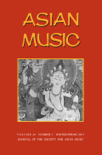
ASIAN MUSIC
Fostering Interdisciplinary Insights into Asian Music.ASIAN MUSIC is a distinguished academic journal published by University of Texas Press, focusing on the rich and diverse musical traditions of Asia. With an ISSN of 0044-9202 and an E-ISSN of 1553-5630, this journal serves as a key platform for interdisciplinary research that encompasses musicology, ethnomusicology, and cultural studies related to Asian music practices. While ASIAN MUSIC is not an open-access journal, it provides valuable insights and scholarly articles that contribute significantly to the understanding of music’s role within Asian cultures. The journal originally covered works from 2002 to 2010 and has a reputation for fostering discussions that celebrate the intricacies of sound, performance, and society. Targeting researchers, professionals, and students alike, ASIAN MUSIC stands as a crucial resource for those engaged in the study of music in its multifaceted context.

Revista de Musicologia
Empowering Music Scholars with Original ResearchRevista de Musicologia is a distinguished academic journal dedicated to the exploration and analysis of musicology, published by the SOC ESPANOLA MUSICOLOGIA. Based in Spain, this journal serves as a vital platform for music scholars, researchers, and enthusiasts to share innovative insights and original research concerning various aspects of music, including historical studies, ethnomusicology, and contemporary critiques. With its ISSN 0210-1459 and a current Scopus ranking placing it in the Q3 quartile of Music studies, the journal reflects a commitment to enhancing the discourse in this rich field. Although it currently does not publish under an open-access model, it continuously aims to provide a rigorous peer-reviewed environment for contributions that engage both academic inquiry and practical applications within musicology. The Revista de Musicologia is thus an essential resource for anyone in the field looking to expand their understanding and expertise in music studies from 2016 through 2024 and beyond.

FONTES ARTIS MUSICAE
Connecting scholars and practitioners in the realm of music.FONTES ARTIS MUSICAE, with ISSN 0015-6191 and E-ISSN 2471-156X, is a distinguished journal published by A-R EDITIONS, specializing in the fields of Music and Library and Information Sciences. Established in the United States, this journal serves as a vital resource for scholars, practitioners, and students engaged in the exploration and analysis of music and its associated disciplines. With an established converged publication history from 2002 to 2024, FONTES ARTIS MUSICAE has consistently contributed to the discourse within its scope, reflected in its current quartile rankings of Q4 in Library and Information Sciences and Q3 in Music for 2023. Although not an open-access journal, it offers essential insights and research findings, appealing to a diverse academic audience. Its position within the 18th percentile of the Arts and Humanities (Music) category and 11th percentile in Library and Information Sciences underscores its growing significance in these fields, making it a critical platform for advancing knowledge and fostering collaboration.
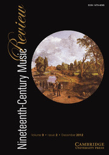
Nineteenth-Century Music Review
Exploring the Harmonies of a Century PastNineteenth-Century Music Review, published by CAMBRIDGE UNIVERSITY PRESS, is an essential scholarly journal in the field of musicology, particularly focusing on the vibrant and transformative period of the nineteenth century. This journal, archived under ISSN 1479-4098 and E-ISSN 2044-8414, serves as an invaluable platform for researchers, professionals, and students alike who are dedicated to exploring the multifaceted interactions between music and society during a time of significant cultural change. With its commitment to high-quality research and critical discourse, it embraces a diverse range of topics, including historical analysis, performance practice, and socio-cultural contexts within music. Operating from the United Kingdom, Nineteenth-Century Music Review is currently categorized in the fourth quartile of music journals according to Scopus rankings, offering a unique opportunity for emerging scholars to contribute to the expanding dialogue in this niche while also reaching a broad audience within the arts and humanities. Although the journal follows a traditional subscription-based model, it continues to be a pivotal resource for academic inquiry and knowledge dissemination in the landscape of nineteenth-century music history.

MUSICAL TIMES
Navigating the Rich Tapestry of Musical DiscourseMUSICAL TIMES is a distinguished journal dedicated to the exploration and dissemination of scholarly works in the realm of music, serving as an essential resource for researchers, professionals, and students alike. Published by MUSICAL TIMES PUBLICATIONS LTD, this journal has built a robust reputation within the arts and humanities, specifically focusing on music studies, with an impactful reach indicated by its Scopus ranking at #73 out of 106 in the field. Though access to this journal is not open, its curated content, which spans various facets of musicology and contemporary music discourse, enriches the academic community by encouraging insightful discussions and critical analyses. With its historical roots tracing back to its inception, MUSICAL TIMES aims to foster a deeper understanding of music's cultural, social, and artistic dimensions, making it a valued publication for those engaged in the scholarly pursuit of music.
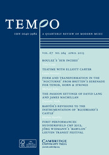
TEMPO
Illuminating Innovations in Music StudiesTEMPO, a renowned journal published by Cambridge University Press, is dedicated to the expansive field of music studies. With its rich history dating back to 1939, the journal has significantly evolved, offering researchers, professionals, and students a platform to explore diverse musical perspectives and innovations. Serving as a vital resource in its category, TEMPO is currently positioned in the Q2 quartile within the field of Music, reflecting its quality and academic influence. Although it operates under a traditional subscription model, its impactful contributions to music scholarship are underscored by its active engagement with contemporary issues in musicology, performance, and education. Researchers can rely on TEMPO for cutting-edge analyses, reviews, and critical discourse that shape the understanding of music in society.
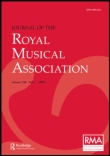
JOURNAL OF THE ROYAL MUSICAL ASSOCIATION
Bridging traditional and contemporary musicology.JOURNAL OF THE ROYAL MUSICAL ASSOCIATION, published by Cambridge University Press, stands as a significant repository for innovative research and scholarly discourse within the field of music studies. Recognized for its contributions to the understanding of musical practices, theory, and history, this esteemed journal offers a platform for academics and researchers to disseminate their findings to a broad audience. With an ISSN of 0269-0403 and E-ISSN of 1471-6933, the journal has maintained a notable presence since its inception, merging insights from both traditional and contemporary musicology. It currently occupies a Q4 ranking in Music within the Scopus database, reflecting its inclusion within the arts and humanities landscape. While the journal traditionally operates under subscription access, its continuing commitment to advancing music scholarship ensures that it remains an essential resource for students, scholars, and practitioners alike, fostering greater understanding and appreciation of musical artistry from 1987 to the current era.

MUSIKFORSCHUNG
Exploring the Depths of Music ScholarshipMUSIKFORSCHUNG is a distinguished journal in the field of music studies, published by NEUWERK-BUCH UND MUSIKALIENHANDLUNG in Germany. With its ISSN 0027-4801, the journal caters to scholars, practitioners, and students interested in the diverse realms of musicology. Although it is currently not an Open Access publication, MUSIKFORSCHUNG plays a vital role in the academic landscape by disseminating research and critical discourse on music from various historical and contemporary perspectives. The journal has established its worth in the academic community, being categorized in the Q4 quartile in Music for 2023 and holding a rank of #169 out of 180 in the Scopus Arts and Humanities Music category, placing it within the 6th percentile. With publication activities spanning from 2002 to 2013 and resuming in 2016 through to 2024, MUSIKFORSCHUNG continues to be a crucial resource for those dedicated to advancing music scholarship. Set in the cultural heart of Kassel, Germany, the journal invites contributions that foster an understanding of music's impact on society and culture.
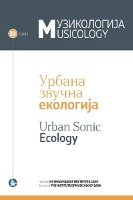
Muzikologija-Musicology
Transforming Music Research into Global DialogueMuzikologija-Musicology, published by the esteemed Serbian Academy of Sciences and Arts, Institute of Musicology (SASA), serves as a pivotal platform for scholarly discourse in the field of musicology. With its ISSN 1450-9814 and E-ISSN 2406-0976, this open-access journal has been committed to disseminating high-quality research since 2002, making significant contributions to the understanding and analysis of music in diverse cultural contexts. Located in Belgrade, Serbia, the journal proudly holds a Q2 ranking in the Music category for 2023, reflecting its high-impact contributions as evidenced by its Scopus rank of #136/180 and a percentile of 24th. Covering a wide array of topics within music, from ethnomusicology to music theory and history, it invites contributions that push the boundaries of music research. By fostering an open-access model, Muzikologija-Musicology aims to ensure that its findings are accessible to a global audience, thereby enriching the discourse and fostering collaboration in the musicology community.